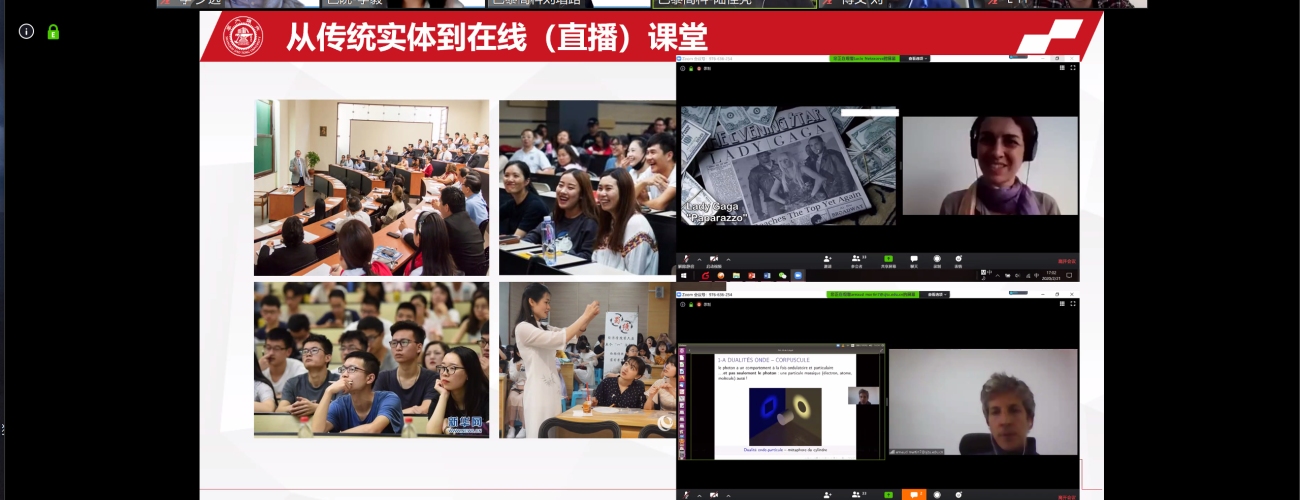
teaching online - SPEIT
SPEIT
Sino-French Institutes in times of pandemic Shanghai Jiao Tong – ParisTech Elite Institute of Technology (SPEIT)
Shanghai Jiao Tong – ParisTech Elite Institute of Technology (SPEIT) is the result of a strategic alliance between ParisTech and the Shanghai Jiao Tong University. It unites the strengths of French graduate engineering schools (ENSTA Paris, MINES ParisTech, Telecom Paris, Ecole Polytechnique) and those of Shanghai Jiao Tong University, allowing SPEIT to train top engineers, and guaranteeing educational and research programs quality.
Frédéric Toumazet, French dean since September 2018, and two teachers – Fredy Tabourin, coordinator for FLE (French as a Foreign Language), and Arnaud Martin, teacher and coordinator in physics, deliver their testimonial.
How did you experience the COVID-19 crisis in China?
In China, or in Shanghai to be precise, everyone seemed to be in a kind of stupor at first. The city was already empty because people had left for the Chinese New Year holiday, and the situation seemed surreal. After the first few days, the restrictions began: masks, sometimes gloves too, and stringent health checks.Very quickly, in the first few days of the holidays, our institute administration sought to measure the extent of this crisis, and imagine solutions to deploy and ensure the educational continuum.
How was the crisis managed with regard to the students?
Our students were rapidly informed of the pedagogical decisions taken by SPEIT. Quickly, with great professionalism and a keen sense of responsibility, the teachers responded positively to the deans’ requests to set up online teaching demonstration and test sessions at the return from Chinese New Year holidays.
The validation of these models made it possible to start the semester as serenely as possible, and with only one week of delay on the original calendar.
F.T.: The biggest challenge was how to support our exchange students. In what was already a complicated situation, we had to assist French students here who wanted to go home, and then when the crisis reached France, we had to turn our attention to students there who wanted to come back to China. With the crisis unfolding on a different timescale in the two countries, the health guidelines and restrictions were not always the same, and this led to considerable confusion and worry.
What main tools were used?
F.T.: The tools made available were partly the tools conventionally used at SJTU and SPEIT (Canvas and Moodle), but we also massively used Zoom. Of course, the usual communication tools in China, such as WeChat, made it easier to use the other software. Depending on the discipline, the teachers used the tools made available differently.
F.Ta.: For French language courses, we immediately favored tools common to the entire teaching staff, relatively easy to use and most suited to the needs of our courses. Our choice therefore naturally fell on the tools offered by the university, namely Canvas (that allowed the provision of self-learning documents, and the deposit of students’ homework), and Zoom (for live sessions of interaction and Q&A with students). We also used traditional communication tools such as emails and WeChat.
A.M.: For physics, the solutions we adopted for online training were essentially the same as for other classes, so to facilitate access for students. They could easily go to the essential without having to learn how to use the tools, and thus concentrate on the subject taught. The Moodle platform was used to provide PDF documents and mp4. The videos posted there were recordings of lessons prepared by the teachers. They were based on PPT slides and on handouts given to the students, both commented by the teachers. Live online courses were also held: the professor would teach the course, with PPT slides or handouts shared with students, and when necessary, answer the students' questions live.
Is this crisis over for you?
F.T.: Unfortunately, the crisis is not over. We must find back the balance we had before: bring back students, teachers, resume ongoing relationships with our various academic and industrial partners ... It will take time.
You are already preparing for the start of the 2020 academic year: what actions are planned for welcoming students and organizing classes?
F.T.: It is very complicated today to foresee an "ordinary" return to school. On the one hand, we have no certainty on the reopening of campuses over time, neither in France nor in China, and no idea on the reopening of borders. How can we organize exchange semesters in these conditions? How can we welcome our teachers from partner schools for their missions? We’ve learned a great deal about how to teach online. We’re going to need to continue to build on this and apply everything we’ve discovered during this period to our regular teaching activities. We will undoubtedly have to keep in mind the need to cultivate these practices, either to replace or to supplement the traditional pedagogical tools.
What lessons / perspectives do you draw from this crisis?
F.T.: This crisis has undoubtedly shown certain weaknesses in our system. But not only. It has shown us our capacity to mobilize and defend our school and the values it defends, despite many difficulties. As the French Dean, I would like to congratulate and warmly thank the whole SPEIT family for their efforts.

